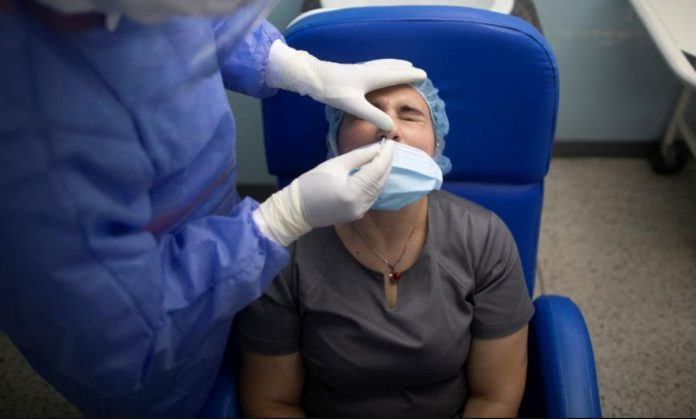Does it spread more easily? Do people get sicker? Does it mean that the treatments and vaccines won’t work?
Questions are multiplying as fast as new strains of the coronavirus, mainly the one now spreading in England.
Scientists say there is cause for concern, but new strains should not cause alarm.
Where did it come from?
New variants have been seen almost since the virus was detected in China almost a year ago. Viruses often develop small changes (mutations) as they reproduce and spread in a population, something that “is natural and predictable,” the WHO said in a statement Monday.
“Most mutations are negligible. It’s the one- or two-letter change in the genetic alphabet that doesn’t make much difference in the ability to cause disease,” said Dr Philip Landrigan, who used to work at the Centers for Disease Control and Prevention and now runs a global health program at Boston College.
A more worrying situation is when a virus mutates by changing proteins on its surface to help it escape drugs or the immune system, or if it acquires many changes that make it very different from previous versions.
- Does This Mean We Stopped Being Animal and Started Being Human Due to ‘Copy Paste’ Errors?
- The One Lifestyle Choice That Could Reduce Your Heart Disease Risk By More Than 22%
- Aging: This Is What Happens Inside Your Body Right After Exercise
- Immune-Boosting Drink that Mimics Fasting to Reduce Fat – Scientists ‘Were Surprised’ By New Findings
- Gun Violence in America: What They Don’t Talk About at the Debate
How does a strain become dominant?
That can happen if it’s a “founder” strain – the first to take root and start spreading in an area or because “super-spreading” events helped it establish itself.
It can also happen if a mutation gives a new variant an advantage, such as helping it spread more easily than other circulating strains, as might be the case in Britain.
“It is more contagious than the original strain,” Landrigan said. “The reason it becomes the dominant strain in England is because it outperforms the other strains, it moves faster and infects more people, so it wins the race.”
Moncef Slaoui, advisor to the US government for the COVID-19 vaccination campaign, said scientists are still working to confirm whether the strain in England spreads more easily.
The strain was first detected in September, WHO officials reported.
What’s so troubling about it?
It has several mutations – nearly two dozen – and eight are in the spicular protein that the virus uses to attach itself to cells and infect them. This protein is what it uses for the development of vaccines and antibody drugs.
Dr Ravi Gupta, a virus expert at the University of Cambridge, England, said model studies indicate it could be up to two times more infectious than the strain that has so far been the most common in England. He and other researchers published a report about it on a website scientists use to share advances, but it has not been formally reviewed or published in a journal.
How does it relate to the number of sick or dead?
“There is no indication that either is true, but clearly these are issues for us to look at,” Landrigan said. As more patients become infected with the new strain, “they will know relatively soon if the new strain is making people sicker.”
Maria Van Kerkhove, an expert on epidemics at the WHO, said Monday that “the information we have so far is that there are no changes” in the type of disease or its severity due to the new strain.
What do mutations mean for treatments?
A couple of cases in England raise concern that mutations in some of the new strains could lower the potency of drugs that provide antibodies to prevent the virus from infecting cells.
“Studies of the antibody response are currently being carried out. We look forward to the results for the next days and weeks,” said Van Kerkhove.
One pharmacist, Eli Lilly, said that tests in her lab using strains containing the most worrisome mutation indicate that the drug is still fully active.
What about vaccines?
Slaoui indicated that the assumption is that current vaccines will still be effective against the variant, but that scientists are working to confirm this.
“My expectation is that this won’t be a problem,'” he said.
UK officials have said they “don’t think there’s an impact on vaccines,'” Van Kerkhove said.
Vaccines induce extensive immune system responses in addition to causing the immune system to develop antibodies against the virus, so they are expected to still work, several scientists said.
Will the travel restrictions work?
Landrigan thinks so.
“If the new strain is really more contagious than the original strain, then it is very sensible to restrict travel,” he said. “It will slow things down. As long as you can break the chain of transmission, you can slow down the virus.”
Fauci said he was not criticizing other countries for suspending travel to England, but would not advise the United States to take such action, according to CNN.
At the moment the presence or scope of the new strain in the United States is unknown.
What can I do to reduce my risk?
Follow the advice to wear a chinstrap, wash your hands frequently, maintain social distancing, and avoid large groups, public health experts say.
“Bottom line, we need to suppress transmission” of all the virus strains that cause COVID-19, said WHO Director-General Dr. Tedros Adhanom Ghebreyesus.
“The more we allow it to spread, the more mutations there will be.”
